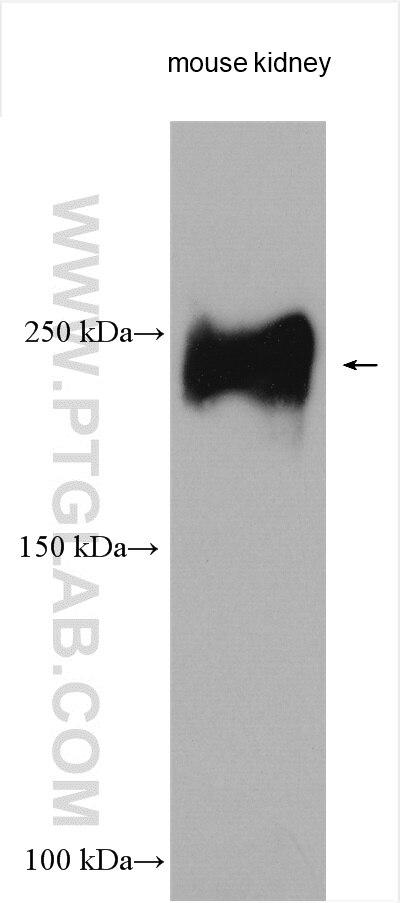Tested Applications
| Positive WB detected in | mouse kidney tissue |
Recommended dilution
| Application | Dilution |
|---|---|
| Western Blot (WB) | WB : 1:600-1:2000 |
| It is recommended that this reagent should be titrated in each testing system to obtain optimal results. | |
| Sample-dependent, Check data in validation data gallery. | |
Published Applications
| WB | See 1 publications below |
Product Information
28524-1-AP targets THSD7A in WB, ELISA applications and shows reactivity with Human, Mouse samples.
| Tested Reactivity | Human, Mouse |
| Cited Reactivity | human |
| Host / Isotype | Rabbit / IgG |
| Class | Polyclonal |
| Type | Antibody |
| Immunogen |
CatNo: Ag29107 Product name: Recombinant human THSD7A protein Source: e coli.-derived, PET28a Tag: 6*His Domain: 1305-1485 aa of NM_015204 Sequence: TGKMIRRRTVTQPFQGDGRPCPSLMDQSKPCPVKPCYRWQYGQWSPCQVQEAQCGEGTRTRNISCVVSDGSADDFSKVVDEEFCADIELIIDGNKNMVLEESCSQPCPGDCYLKDWSSWSLCQLTCVNGEDLGFGGIQVRSRPVIIQELENQHLCPEQMLETKSCYDGQCYEYKWMASAWK Predict reactive species |
| Full Name | thrombospondin, type I, domain containing 7A |
| Calculated Molecular Weight | 185 kDa |
| Observed Molecular Weight | 240-250 kDa |
| GenBank Accession Number | NM_015204 |
| Gene Symbol | THSD7A |
| Gene ID (NCBI) | 221981 |
| RRID | AB_2918172 |
| Conjugate | Unconjugated |
| Form | Liquid |
| Purification Method | Antigen affinity purification |
| UNIPROT ID | Q9UPZ6 |
| Storage Buffer | PBS with 0.02% sodium azide and 50% glycerol, pH 7.3. |
| Storage Conditions | Store at -20°C. Stable for one year after shipment. Aliquoting is unnecessary for -20oC storage. 20ul sizes contain 0.1% BSA. |
Background Information
Thrombospondin type-1 domain-containing protein 7A (THSD7A) is a membrane-associated N-glycoprotein with a molecular weight of 250 kDa, which can be cleaved to release a 210-kDa soluble form (PMID: 22194972; 27214550). THSD7A has a role in angiogenesis. It mediates endothelial cell migration and tube formation (PMID: 2002048). THSD7A has been identified as a second autoantigen involved in adult idiopathic membranous nephropathy in addition to PLA2R1 (PMID: 25394321).
Protocols
| Product Specific Protocols | |
|---|---|
| WB protocol for THSD7A antibody 28524-1-AP | Download protocol |
| Standard Protocols | |
|---|---|
| Click here to view our Standard Protocols |




